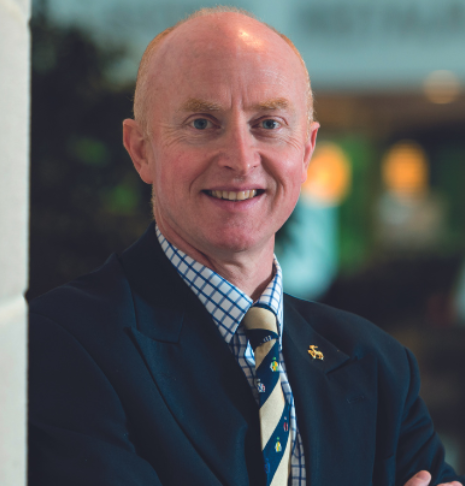Behind the study: Q&A with Professor Chris Proudman
Professor Chris Proudman and a team of researchers from Surrey's School of Veterinary Medicine and School of Bioscience have conducted a groundbreaking investigation into the compos

The study, published in the journal Scientific Reports and reported by the BBC, found that the athletic performance of the foals was positively associated with higher faecal bacterial diversity at one month old. The team also investigated the long-term impact of foals receiving antibiotics during the first month of life and how this affected their chances of developing a respiratory disease.
We caught up with Professor Proudman to find out more about the study, his career at Surrey and his latest research projects...
Chris, before we find out about the latest research, tell us a bit about yourself and your career to date…
Chris: “My veterinary career has always focussed on equine health and gastrointestinal health in particular. I spent 25 years working as a clinician, teacher and researcher in a university vet school before moving to Surrey to lead the development our new School of Veterinary Medicine. This was a fabulous opportunity to develop a new model of veterinary education and to build One Health research capacity within the University.”
What does your current role entail?
Chris: “Since passing on the baton to a new Head of School one year ago, I have been able to dedicate more time to research and to build a research group dedicated to understanding the relationship between the horse and its resident bacterial population. Much of my work is population-based, meaning that I work with a network of collaborators to sample populations of privately-owned horses, analyse these samples to characterise bacterial communities and then link this information to health and performance data. My role is to secure funding for projects and to bring together teams with complementary expertise to deliver the project objectives. Success for a clinical researcher like me is the translation of my research findings into real health and welfare benefits for horses.”
Your latest research has found that the composition of gut bacteria of Thoroughbred racehorses at one month old can predict their future athletic performance – tell us more about this.
Chris: “Our understanding of the complex and critical role that bacteria play in the health of human and animal hosts is growing all the time. Our latest research documents the changes in gut bacterial populations during the early weeks of life of foals. We then tracked health outcomes for these horses over a three-year period and also obtained data on their racing performance. These combined data allowed us the answer the question: How do early life gut bacterial population influence future health and athletic performance. The answer to these questions is that both health and athletic performance are significantly associate with bacterial community profile of foals at one week of age. We also identified gut bacterial families whose abundance at one week of age was associated with racing performance and risk of disease later in life.”
How does this fit with our One Health agenda?
Chris: “Our study illustrates a biological principle that likely applies to all mammals including humans. Research in humans has recently demonstrated associations between early-life gut microbial populations and the risk of respiratory and intestinal disease. Our research is the first to demonstrate an association with future athletic performance. Also of relevance are the implications of our study on slowing the development of antimicrobial resistance. We demonstrate the detrimental, long-term impact of antibiotic use in foals early in life which reinforces the message that antibiotics should be used sparingly and appropriately.”
What is next for you and your research?
Chris: “We have already started an industry-funded project to identify and characterise novel probiotic bacteria that can be used to support a healthy gut microbiome in very young foals. We have also secured follow-on funding for the Well Foal Study II, to investigate the transfer of bacteria from the mare to her foal and to use our novel, in vitro gut model to explore how the detrimental impact of antimicrobial treatment in young foals can be mitigated. These next steps are vital in translating our research findings into health benefits for horses.”
What’s the best thing about your role at Surrey?
Chris: “Collaboration, both internal and external. I am fortunate to work with talented and curious colleagues in the university who embrace collaboration and recognise the potential of multi-disciplinary teams. We have also established an enthusiastic and highly motivated network of external veterinary surgeons and stud farm managers who bring an industry perspective to our work. They enjoy being part of an academic research group and without their help it would be impossible to conduct population-based studies of this nature.”
Media Contacts
External Communications and PR team
Phone: +44 (0)1483 684380 / 688914 / 684378
Email: mediarelations@surrey.ac.uk
Out of hours: +44 (0)7773 479911
